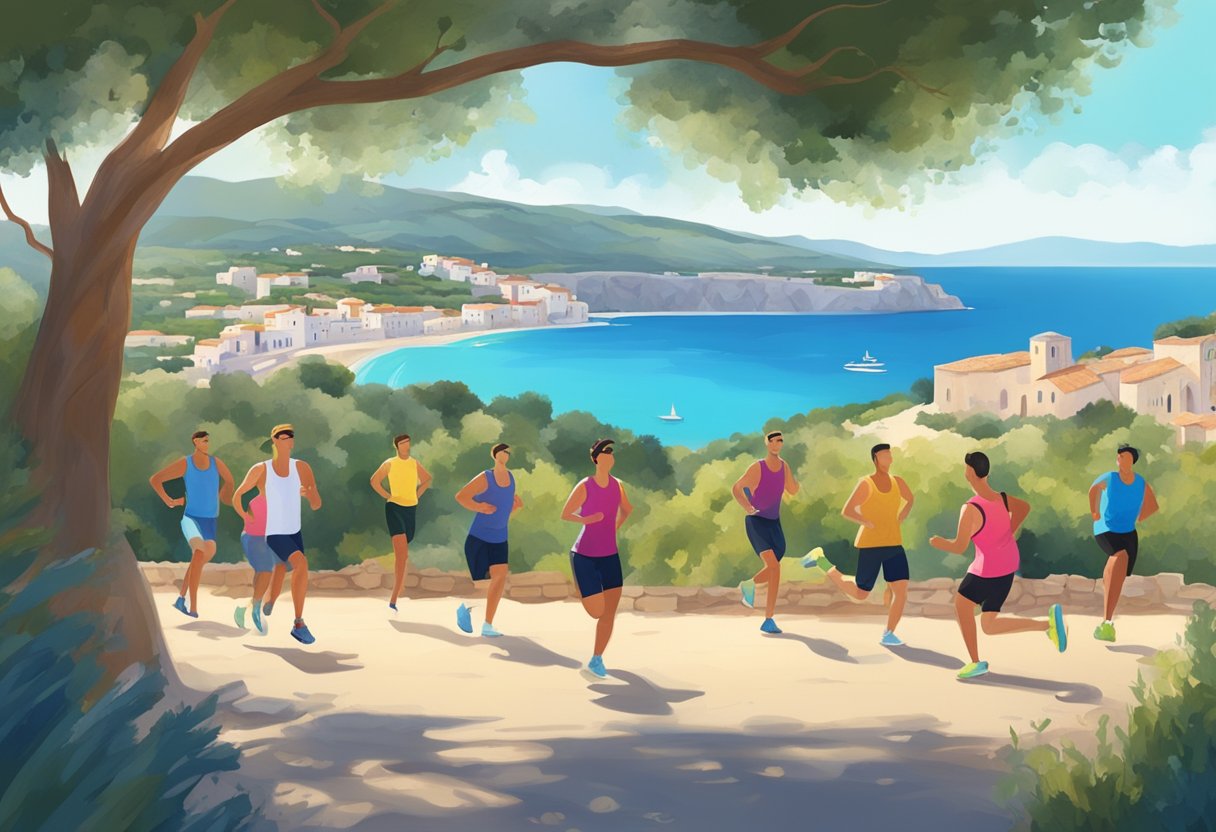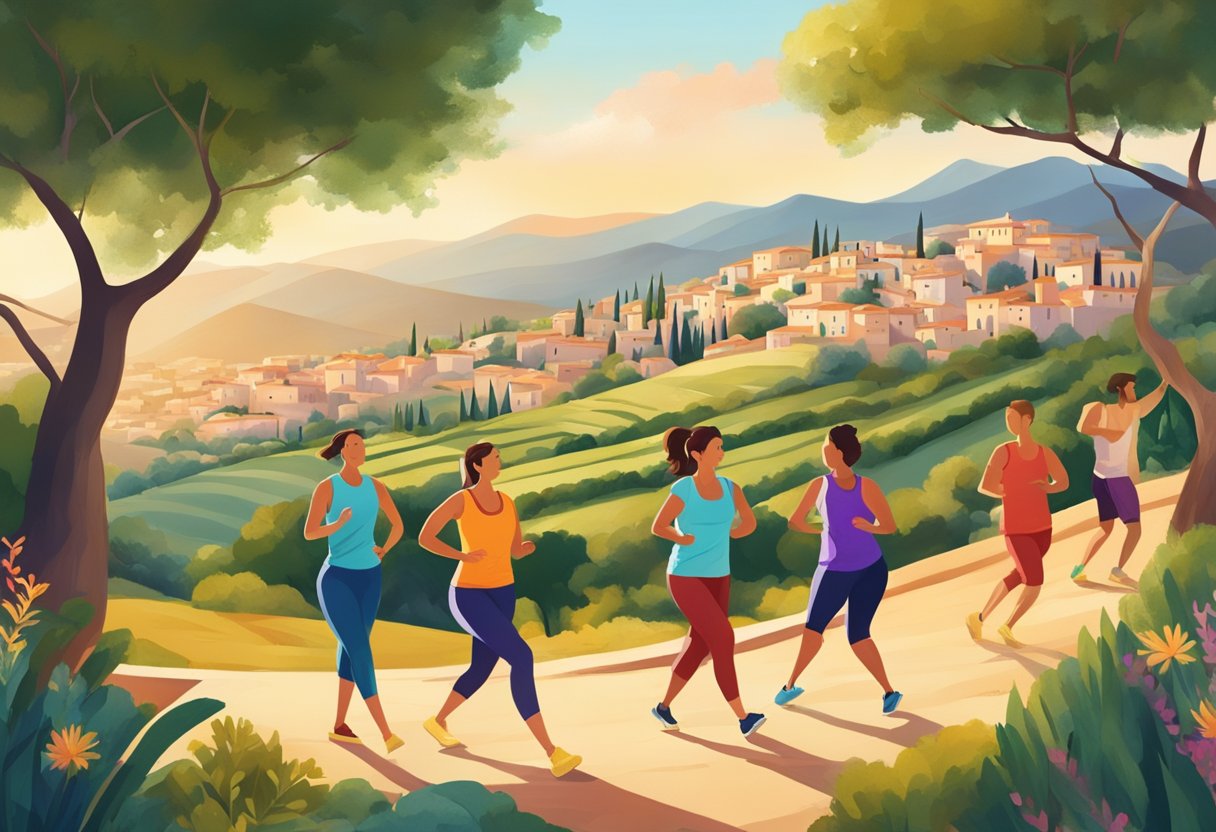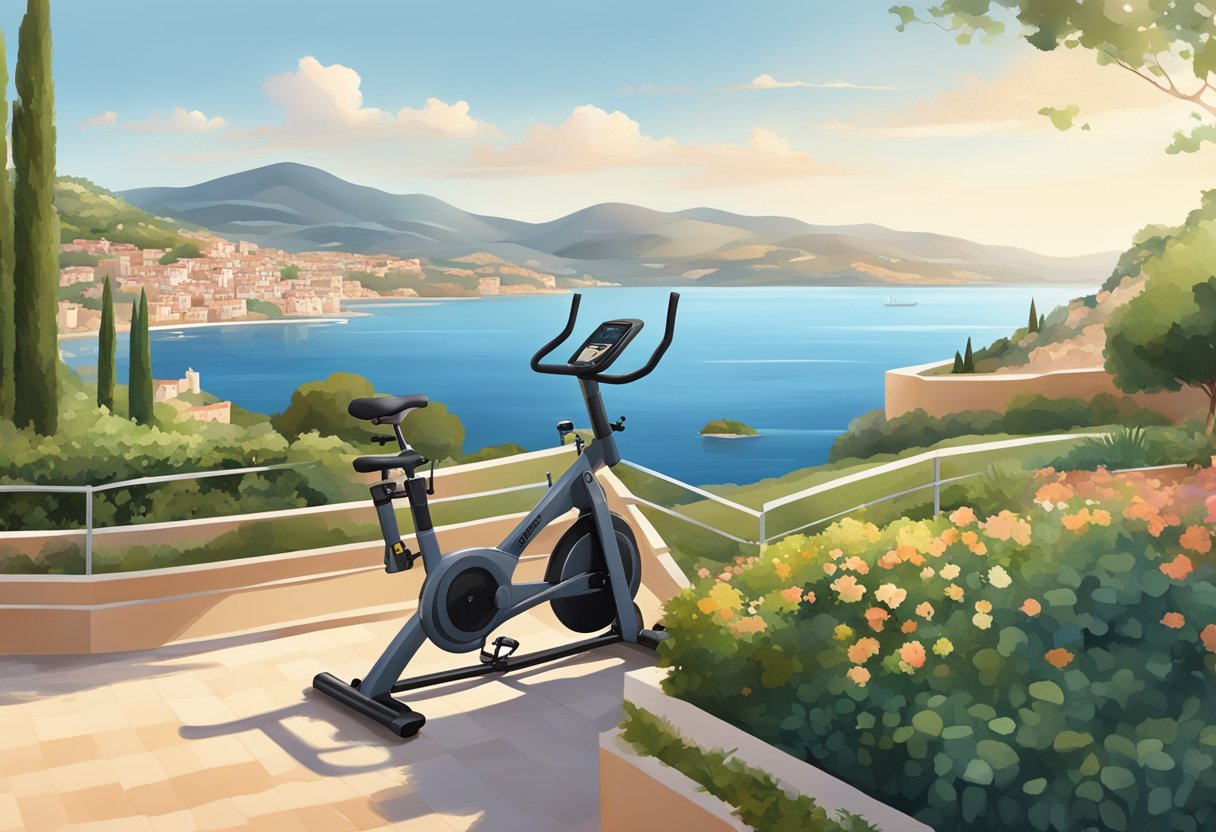The Mediterranean lifestyle synthesizes a heart-healthy diet with an emphasis on physical activity, a combination that has served as a cornerstone for health and longevity among Mediterranean populations. Not limited to just food, this approach views physical exercise as a natural part of daily life, ranging from traditional practices like farming and walking to modern, structured regimens. Embracing this lifestyle in today’s busy world implies integrating movement into routine activities, emphasizing the importance of using our bodies in the way they were inherently designed to move and function.

Cultural and environmental factors have shaped the diverse physical activities traditionally found in Mediterranean countries. This reflects not only in a lower prevalence of chronic diseases but also in public health benchmarks that many Western countries strive to achieve. These activities have evolved over time, adapting to contemporary lifestyles while still adhering to the principles of a healthy Mediterranean lifestyle. Nutrition plays a fundamental role, supporting energy needs and recovery, and the synergy between diet and exercise is recognized for its potential to manage, and even prevent, chronic health conditions.
Key Takeaways
- The Mediterranean lifestyle is an integration of diet and natural physical activities that promote health.
- Adaptation of traditional exercises to modern lifestyles preserves the essence of Mediterranean physical activity.
- Synergy between diet and exercise is crucial in managing chronic diseases and fostering overall health.
Table of Contents
Mediterranean Diet and Physical Activity Synergy
The Mediterranean Diet, rich in nutrients, and the culture of consistent Physical Activity are deeply interwoven, presenting a symbiotic relationship central to the lifestyle of the Mediterranean peoples.
Historical Background of Mediterranean Lifestyle
Ancel Keys’ Seven Countries Study first shed light on the Mediterranean diet’s potential health benefits, highlighting its high intake of vegetables, fruits, legumes, and nuts, and a healthy dose of olive oil as the primary source of fat. These dietary elements, coupled with traditional labor-intensive lifestyles, forged a template of well-being that the modern world admires.
Role of Physical Activity in Mediterranean Culture
The Mediterranean lifestyle is not merely a dietary pattern; it’s a holistic approach that seamlessly integrates physical activity (PA) into everyday life. Traditional occupations often involved manual labor, such as farming and fishing, which naturally promoted physical health. Today, this translates into an emphasis on daily movement, whether through structured exercise or incorporating more walking and cycling into routine activities.
Health Benefits of Mediterranean Physical Activities
Physical activity within the Mediterranean lifestyle is not just focused on exercise but also on promoting overall well-being. Engaging in traditional and modern physical activities has profound effects on various health outcomes.
Impact on Cardiovascular Health
Regular physical activity is a cornerstone of cardiovascular health, with a well-established relationship to reduced cardiovascular disease. Studies have shown that participating in Mediterranean physical activities, such as brisk walking or cycling, significantly improves the lipid profile and decreases blood pressure, leading to a lower risk of heart events. This form of exercise, coupled with the high diet quality of the Mediterranean lifestyle, contributes to better heart health and reduced all-cause mortality.
Prevention of Metabolic Syndrome and Diabetes
The synergistic effect of Mediterranean diet and regular exercise plays a critical role in the prevention of metabolic syndrome and diabetes mellitus. Physical activity, characteristic of the Mediterranean lifestyle, enhances insulin sensitivity and glucose metabolism, which are vital for preventing the progression from metabolic syndrome to type 2 diabetes. Furthermore, it helps maintain a healthy weight, which is an important factor in diabetes management.
Role in Weight Management and Obesity Prevention
Engaging in Mediterranean physical activities aids in weight loss and obesity prevention. Regular exercise is integral for energy expenditure and helps in maintaining a balanced weight. This is particularly important in the Mediterranean lifestyle as it focuses on both diet and physical activity for managing overweight/obesity issues. Emphasizing on activities such as gardening, swimming, or group sports, the lifestyle promotes health benefits including weight control and a boosted metabolism.
Traditional Mediterranean Exercises

The traditional exercises of the Mediterranean are deeply rooted in the region’s cultural heritage and are sustained by a lifestyle that values conviviality and sustainability. These activities blend seamlessly with the Mediterranean’s ethos of welness and social interaction.
Common Physical Activities in the Mediterranean
In the Mediterranean region, physical activity is often interwoven with daily life rather than being separated as a distinct task. Walking is a central feature, frequently favored due to the region’s climate and geography. Agrarian tasks, such as tending to vineyards or olive groves, are common, contributing to an active lifestyle that is simultaneously sustainable.
- Dancing: Traditional dances, often linked to community festivals and religious celebrations, are a form of exercise that reinforces cultural bonds.
- Swimming: With the sea never far away, swimming is a widespread and culturally significant activity that underscores the Mediterranean’s connection to its natural environment.
Cultural Significance of Recreational Exercises
Recreational exercises in the Mediterranean are more than a means to physical health; they are a vehicle for cultural expression. They cultivate a spirit of conviviality and are carried out in a collective setting, facilitating social cohesion and a shared sense of identity.
- Bocce: A ball sport closely related to British bowls and French pétanque, which is commonly played in a social setting.
- Yoga and Pilates: While not traditional, these exercises have been adopted in modern times, aligning with the Mediterranean values of balance and mind-body harmony.
Traditional exercises in the Mediterranean underscore the importance of lifestyle habits that honor cultural heritage and religion, promoting health through sustainable activities that enhance both individual well-being and social welfare.
Modern Adaptations of Mediterranean Activities

The Mediterranean lifestyle, celebrated for its health benefits and balance, has adapted to modern times by incorporating Western exercise trends while finding novel ways to merge traditional practices with new fitness approaches.
Influence of Western Exercise Trends
In today’s globalized world, Western exercise trends have made a significant impact on Mediterranean activities. Influential exercise regimens like high-intensity interval training (HIIT) and CrossFit have been embraced by many Mediterranean fitness enthusiasts. This adaptation caters to a fast-paced lifestyle and offers a strategy to combat the physical inactivity that often accompanies a Westernized diet and lifestyle. Gym facilities and group fitness classes in Mediterranean regions now routinely feature these trends, as they address the physiology of fitness in time-efficient manners, aligning with the time-restricted schedules of modern life.
Fusion of Traditional and Contemporary Workouts
The fusion of traditional Mediterranean activities with contemporary workouts represents an innovative form of lifestyle medicine dedicated to health promotion. For example, yoga and Pilates, which emphasize core strength and flexibility, have been integrated with traditional Mediterranean exercises that focus on natural movements, offering a holistic approach to physical well-being. This synthesis aligns with Mediterranean values of wellness and longevity, blending time-honored practices like walking and swimming with modern exercise philosophies. Such combinations foster the preservation of cultural exercise rituals while supporting contemporary health objectives.
Nutritional Aspects Supporting Physical Health

Ensuring a nutrient-rich diet is fundamental to supporting physical health and enhancing the benefits of exercise and recovery. The Mediterranean lifestyle offers a dietary pattern that is not only rich in diverse nutrients but is also adaptable to include gluten-free options.
Role of Diet in Exercise and Recovery
Diet plays a critical role in providing the energy necessary for exercise and in supplying the nutrients required for recovery. Traditional Mediterranean dietary patterns emphasize the consumption of whole, unprocessed foods that are naturally gluten-free — such as olive oil, fruits, legumes, nuts, and fish — which collectively offer a wide array of nutrients and antioxidants.
- Olive oil is celebrated for its monounsaturated fats and bioactive compounds that can reduce inflammation.
- Fruits and vegetables are cornerstone foods providing vitamins, minerals, and dietary fiber.
- Legumes and nuts, rich in protein and other nutrients, serve as excellent meat alternatives.
- Fish provides high-quality protein and essential omega-3 fatty acids, pivotal in post-exercise recovery.
The emphasis on these foods supports gluten intolerance while promoting a holistic approach to rest and recovery following physical activity.
Balancing Macronutrients and Bioactive Compounds
Achieving a balance of macronutrients — carbohydrates, proteins, and fats — is crucial for those engaging in physical activity within a Mediterranean lifestyle framework. Strategically incorporating gluten-free grains like quinoa and buckwheat can provide necessary carbohydrates without gluten exposure.
- Proteins from fish, legumes, and dairy products help repair and rebuild tissues post-exercise.
- Nuts and seeds offer healthy fats and are valuable sources of energy and satiety.
- Dairy or plant-based dairy alternatives, rich in calcium and protein, aid in muscle function and bone health.
Moderation in alcohol consumption is also advised, given its potential negative impact on exercise performance and recovery. Instead, a focus on water and nutrient-rich herbal teas is recommended for hydration and providing additional antioxidants.
By combining nutrients from a variety of gluten-free foods prevalent in the Mediterranean diet, individuals can support their physical endeavors effectively. This dietary pattern not only facilitates sustained energy levels for exercise but also contributes to better management of type 2 diabetes and overall health through a diet rich in bioactive compounds and a moderation of sugars and unhealthy fats.
Diet, Exercise, and Chronic Disease Management

Integrating a gluten-free Mediterranean diet with regular physical activity has been shown to be influential in the management and prevention of chronic diseases.
Cohort Studies on Lifestyle and Disease
Cohort studies have provided evidence on how lifestyle choices impact the prevalence and management of chronic diseases. These studies often assess dietary adherence, physical exercise, and their collective effect on health-related quality of life. One significant discovery is the consistent association between the Mediterranean lifestyle and reduced incidence of non-communicable diseases, including cancers and type 2 diabetes. Individuals adhering to a diet rich in fruits, vegetables, lean proteins, and whole grains—while excluding gluten—have shown better disease management outcomes.
Meta-analyses of Mediterranean Lifestyle Interventions
Meta-analyses evaluating the effectiveness of the Mediterranean lifestyle on chronic disease prevention and treatment have reinforced the value of moderation and variety. These comprehensive analyses gather data from multiple studies, giving a broader understanding of how the diet and exercise components of the Mediterranean lifestyle contribute to wellness and disease mitigation. The findings typically underscore the health benefits arising from the combined approach of a gluten-free diet and tailored physical activity—not just in the reduction of disease risk but also in enhancing overall well-being.
Lifestyle Factors Beyond Diet and Exercise

In exploring the Mediterranean lifestyle, it’s important to consider factors that contribute to well-being beyond just diet and physical activity. Mental health, environmental context, and social elements all play pivotal roles.
Stress, Rest, and Mental Well-being
A Mediterranean lifestyle embraces a holistic approach to health, considering stress management and adequate rest as essential components for maintaining a positive health status. Practices like siestas and mindful relaxation are not uncommon, reflecting an understanding of the interplay between physical and mental well-being. This mindset encourages not only physical activities but also periods of restful reflection, enhancing one’s overall health-related quality of life.
Environmental and Seasonal Influences on Activity
The Mediterranean climate itself supports a lifestyle that harmonizes with the seasonality and biodiversity of the region. Seasonal variations influence the types of physical activities that individuals engage in, from swimming in the warmer months to hiking during the cooler ones. This attunement to the natural environment also extends to food choices, where there’s a preference for seasonal and locally sourced produce, potentially reducing the intake of refined grains and supporting a gluten-free diet. The environmental context, therefore, subtly shapes an individual’s daily activities and dietary habits, contributing to a comprehensive lifestyle that transcends mere exercise routines.
Implementing Mediterranean Lifestyle Worldwide
The global interest in the Mediterranean lifestyle reflects its potential for positive impacts on health and well-being across diverse populations. Its adaptability and emphasis on social and dietary patterns offer a promising approach to health promotion.
Adaptability to Different Cultural Contexts
The Mediterranean lifestyle is characterized by a pattern of social and dietary habits that have been recognized as an intangible cultural heritage of humanity by UNESCO. This lifestyle, including its gluten-free options, emphasizes plant-based foods, whole grains, healthy fats, and a high intake of fruits and vegetables. It’s inherently flexible, allowing for various cultural contexts to integrate these principles with local culinary traditions. For instance, the substitution of traditional pasta with gluten-free alternatives made from grains like quinoa or rice flour allows individuals with gluten intolerance or celiac disease to adopt this healthy lifestyle without compromising their health needs.
Cultural Relevance:
- Food Choices: Tailoring the Mediterranean-type dietary pattern to regional tastes by incorporating local produce.
- Customization: Adapting the tradition of lengthy, social meals to fit contemporary schedules and social frameworks.
Global Public Health Perspectives
From a public health standpoint, incorporating Mediterranean lifestyle principles could mitigate the adverse health consequences of the Western diet, characterized by high consumption of processed foods and sugars. Health promotion strategies can integrate the Mediterranean-type dietary pattern, advocating consumption of nutrietransforming overall dietary habits.
Key Public Health Strategies:
- Educational Programs: Informing populations about the benefits of healthy fats found in olive oil and nuts.
- Policy Making: Encouraging policies that facilitate access to fresh, seasonal produce and gluten-free whole grains.
By marrying the ancient wisdom from the Mediterranean basin with modern lifestyle medicine, there’s the potential to advance human health on a global scale. Adapting the Mediterranean lifestyle to diverse cultures, and addressing contemporary dietary challenges such as gluten sensitivity, can foster sustainable health-promoting behaviors worldwide.
Frequently Asked Questions

Understanding the relationship between physical activity and the Mediterranean lifestyle provides insight into maintaining health and longevity. This section answers common inquiries on the subject.
What exercise recommendations complement the Mediterranean diet?
To complement the Mediterranean diet, regular physical activities such as walking, swimming, and cycling are recommended. They align with the diet’s emphasis on balance and heart health.
What are the characteristics of a typical Mediterranean lifestyle?
The Mediterranean lifestyle typically includes fresh, nutrient-dense foods, shared meals with family or friends, and a balance between physical work and rest. Daily life may involve walking and recreational activities.
How do the physical activity patterns of modern Mediterranean populations differ from traditional practices?
Modern Mediterranean populations may engage in more structured exercise regimens, like gym workouts or fitness classes, compared to their ancestors who had more physical labor in daily tasks like farming or walking long distances.
What foods and lifestyle practices are essential components of the traditional Mediterranean diet?
The traditional Mediterranean diet emphasizes whole grains, healthy fats such as olive oil, lean proteins like fish, plenty of fruits and vegetables, and moderate wine consumption. Activity-wise, they integrate physical tasks into their daily routines.
How does physical activity integrate with dietary habits in Mediterranean cultures?
In Mediterranean cultures, physical activity complements dietary habits through a holistic approach to wellness, typically involving daily, low-impact exercises like walking or gardening which are part of a routine rather than a separate task.
What are some common traditional exercises or physical activities native to the Mediterranean region?
Traditional activities like farming, fishing, walking, and dancing are native to the Mediterranean region. These physical activities have historically been woven into daily life and cultural practices.



